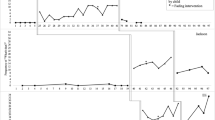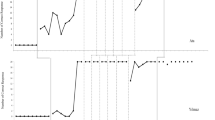Abstract
Social initiations make up a core deficit for children with autism spectrum disorder (ASD). In particular, initiated questions during social interactions are often minimal or absent in this population. In the context of a multiple baseline design, the efficacy of using the motivational procedures of Pivotal Response Treatment to increase social question-asking for three young children with autism was assessed. Results indicated that participants initiated a greater number of targeted questions following intervention. Additionally, all children exhibited increases in initiation of untargeted questions during social interaction in novel settings. Furthermore, post intervention data revealed collateral gains in communication and adaptive behavior. Theoretical implications of incorporating motivational strategies into intervention to improve social initiations in young children with ASD are discussed.



Similar content being viewed by others
References
Bellugi, U. (1965). The development of interrogative structures in children’s speech. In K. Riegel (Ed.), The development of language functions (pp. 103–138). Ann Arbor, MI: University of Michigan Language Development Program.
Brownell, R. (2000). Expressive and receptive one word picture vocabulary tests (2nd ed.). Novato: Academic Therapy Publications, California.
Carr, E. G., Levin, L., McConnachie, G., Carlson, J. I., Kemp, D. C., & Smith, C. E. (1994). Communication-based intervention for problem behavior: A user’s guide for producing positive change (Vol. xxiii). Baltimore, MD: Paul H Brookes Publishing.
Frea, W. D. (1995). Social-communicative skills in higher-functioning children with autism. In R. L. Koegel & L. K. Koegel (Eds.), Teaching children with autism: Strategies for initiating positive interactions and improving learning opportunities (pp. 53–66). Baltimore: Brookes.
Harper, C. B., Symon, J. B. G., & Frea, W. D. (2008). Recess is time-in: Using peers to improve social skills of children with autism. Journal of Autism and Developmental Disorders, 38(5), 815–826.
Hung, D. W. (1977). Generalization of “curiosity” questioning behavior in autistic children. Journal of Behavior Therapy and Experimental Psychiatry, 8(3), 237–245.
Kanne, S. M., Gerber, A. J., Quirmbach, L. M., Sparrow, S. S., Cicchetti, D. V., & Saulnier, C. A. (2011). The role of adaptive behavior in autism spectrum disorders: Implications for functional outcome. Journal of Autism and Developmental Disorders, 41(8), 1007–1018.
Klin, A., Saulnier, C., Sparrow, S., Cicchetti, D., Volkmar, F., & Lord, C. (2007). Social and communication abilities and disabilities in higher functioning individuals with autism spectrum disorders: The Vineland and the ADOS. Journal of Autism and Developmental Disorders, 37(4), 748–759. doi:10.1007/s10803-006-0229-4.
Koegel, L. K. (2000). Interventions to facilitate communication in autism. Journal of Autism and Developmental Disorders, 30(5), 383–391. doi:10.1023/A:1005539220932.
Koegel, L. K., Ashbaugh, K., Koegel, R. L., Detar, W. J., & Regester, A. (2013). Increasing socialization in adults with asperger’s syndrome. Psychology in the Schools (in press).
Koegel, L. K., Camarata, S. M., Valdez-Menchaca, M., & Koegel, R. L. (1997). Setting generalization of question-asking by children with autism. American Journal on Mental Retardation, 102(4), 346–357.
Koegel, L. K., Koegel, R. L., Frea, W. D., & Fredeen, R. M. (2001). Identifying early intervention targets for children with autism in inclusive school settings. Behavior Modification, 25(5), 745–761. doi:10.1177/0145445501255005.
Koegel, L. K., Carter, C. M., & Koegel, R. L. (2003). Teaching children with autism self-initiations as a pivotal response. Topics in Language Disorders, 23(2), 134–145.
Koegel, R. L., & Koegel, L. K. (1995). Teaching children with autism: Strategies for initiating positive interactions and improving learning opportunities. Baltimore, MD: Paul H Brookes Publishing.
Koegel, R. L., & Koegel, L. K. (2006). Pivotal response treatments for autism. Baltimore, MD: Paul H Brookes Publishing.
Koegel, R. L., & Koegel, L. K. (2012). The PRT pocket guide: Pivotal response treatment for autism spectrum disorders. Baltimore, MD: Paul H Brookes Publishing.
Koegel, L. K., Koegel, R., Green-Hopkins, I., & Barnes, C. (2010). Brief report: Question-asking and collateral language acquisition in children with autism. Journal of Autism and Developmental Disorders, 40(4), 509–515. doi:10.1007/s10803-009-0896-z.
Koegel, L. K., Koegel, R. L., Shoshan, Y., & McNerney, E. (1999). Pivotal response intervention II: Preliminary long-term outcome data. The Journal of the Association for Persons with Severe Handicaps, 24(3), 186–198. doi:10.2511/rpsd.24.3.186.
Kratochwill, T. R., Hitchcock, J., Horner, R. H., Levin, J. R., Odom, S. L., Rindskopf, D. M., et al. (2010). Single-case designs technical documentation. Retrieved from What Works Clearinghouse website: http://ies.ed.gov/ncee/wwc/pdf/wwc_scd.pdf.
Lieberman, R. G., Yoder, P. J., Reichow, B., & Wolery, M. (2010). Visual analysis of multiple baseline across participants graphs when change is delayed. School Psychology Quarterly, 25(1), 28.
Lord, C., Risi, S., Lambrecht, L., Cook, E. H., Jr., Leventhal, B. L., DiLavore, P. C., & Rutter, M. (2000). The autism diagnostic observation schedule—generic: A standard measure of social and communication deficits associated with the spectrum of autism. Journal of autism and developmental disorders, 30(3), 205–223.
McConnell, S. (2002). Interventions to facilitate social interaction for young children with autism: Review of available research and recommendations for educational intervention and future research. Journal of Autism and Developmental Disorders, 32(5), 351–372.
Mundy, P., & Crowson, M. (1997). Joint attention and early social communication: Implications for research on intervention with autism. Journal of Autism and Developmental Disorders, 27(6), 653–676. doi:10.1023/A:1025802832021.
Mundy, P., & Sigman, M. (1989). The theoretical implications of joint-attention deficits in autism. Development and Psychopathology, 1(03), 173–183. doi:10.1017/S0954579400000365.
Mundy, P., Sigman, M., & Kasari, C. (1990). A longitudinal study of joint attention and language development in autistic children. Journal of Autism and Developmental Disorders, 20(1), 115–128. doi:10.1007/BF02206861.
Mundy, P., Sigman, M., Ungerer, J., & Sherman, T. (1986). Defining the social deficits of autism: The contribution of non-verbal communication measures. Journal of Child Psychology and Psychiatry and Allied Disciplines, 27(5), 657–669.
Nelson, C., McDonnell, A. P., Johnston, S. S., Crompton, A., & Nelson, A. R. (2007). Keys to play: A strategy to increase the social interactions of young children with autism and their typically developing peers. Education and Training in Developmental Disabilities, 42(2), 165–181.
Newman, B. (2005). Self-management of Initiations by Students Diagnosed with Autism. The Analysis of Verbal Behavior, 21(1), 117.
Oke, N. J., & Schreibman, L. (1990). Training social initiations to a high-functioning autistic child: Assessment of collateral behavior change and generalization in a case study. Journal of Autism and Developmental Disorders, 20(4), 479–497. doi:10.1007/BF02216054.
Paul, R. (2008). Communication development and assessment. In A. Klin, F. Volkmar, & K. Chawarska (Eds.), Autism spectrum disorders in infants and toddlers: Diagnosis, assessment, and treatment. New York, NY: Guilford Press.
Peck, C. A. (1985). Increasing opportunities for social control by children with autism and severe handicaps: Effects on student behavior and perceived classroom climate. Journal of the Association for Persons with Severe Handicaps, 10(4), 183–193.
Rogers, S. J. (2000). Interventions that facilitate socialization in children with autism. Journal of Autism and Developmental Disorders, 30(5), 399–409.
Rowland, C. F., Pine, J. M., Lieven, E. V., & Theakston, A. L. (2003). Determinants of acquisition order in wh-questions: Re-evaluating the role of caregiver speech. Journal of Child Language, 30(3), 609–636.
Sparrow, S. S., Cicchetti, D. V., & Balla, D. A. (2005). Vineland adaptive behavior scales: (Vineland II), survey interview form/caregiver rating form. Livonia, MN: Pearson Assessments.
Stone, W. L., Ousley, O. Y., Yoder, P. J., Hogan, K. L., & Hepburn, S. L. (1997). Nonverbal communication in two- and three-year-old children with autism. Journal of Autism and Developmental Disorders, 27(6), 677–696. doi:10.1023/A:1025854816091.
Taylor, B. A., & Harris, S. L. (1995). Teaching children with autism to seek information: Acquisition of novel information and generalization of responding. Journal of Applied Behavior Analysis, 28(1), 3–14. doi:10.1901/jaba.1995.28-3.
Volkmar, F. R., Lord, C., Bailey, A., Schultz, R. T., & Klin, A. (2004). Autism and pervasive developmental disorders. Journal of Child Psychology and Psychiatry, 45(1), 135–170. doi:10.1046/j.0021-9630.2003.00317.x.
Warren, S. F., Baxter, D. K., Anderson, S. R., Marshall, A., & Baer, D. M. (1981). Generalization of question-asking by severely retarded individuals. Journal of the Association for the Severely Handicapped, 6(3), 15–22.
Warreyn, P., Roeyers, H., Van Wetswinkel, U., & De Groote, I. (2007). Temporal coordination of joint attention behavior in preschoolers with autism spectrum disorder. Journal of Autism and Developmental Disorders, 37(3), 501–512. doi:10.1007/s10803-006-0184-0.
Wetherby, A. M., & Prutting, C. A. (1984). Profiles of communicative and cognitive-social abilities in autistic children. Journal of Speech and Hearing Research, 27(3), 364–377.
Acknowledgments
This project was supported by NIH Grant Award Number R34 DC010924 from NIDCD (PI: R. Koegel). The content is solely the responsibility of the authors and does not necessarily represent the official views of the National Institute of Mental Health or the National Institutes of Health. We would like to express our greatest appreciation to the families and children for their dedication to participate in this study. We would also like to thank Crystal Carrillo, Whitney Detar, and Emily Lydston for their significant contribution to the completion of this research study.
Author information
Authors and Affiliations
Corresponding authors
Additional information
Lynn Kern Koegel and Robert L. Koegel are partners in the private firm, Koegel Autism Consultants, LLC.
Rights and permissions
About this article
Cite this article
Koegel, R.L., Bradshaw, J.L., Ashbaugh, K. et al. Improving Question-Asking Initiations in Young Children with Autism Using Pivotal Response Treatment. J Autism Dev Disord 44, 816–827 (2014). https://doi.org/10.1007/s10803-013-1932-6
Published:
Issue Date:
DOI: https://doi.org/10.1007/s10803-013-1932-6




